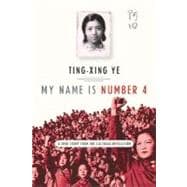
Note: Supplemental materials are not guaranteed with Rental or Used book purchases.
Purchase Benefits
Looking to rent a book? Rent My Name Is Number 4 A True Story from the Cultural Revolution [ISBN: 9780312379872] for the semester, quarter, and short term or search our site for other textbooks by Ye, Ting-xing. Renting a textbook can save you up to 90% from the cost of buying.
Ting-xing Ye is the author of the international bestseller A Leaf in the Bitter Wind. Once an English interpreter for the Chinese government, she now lives in Canada.
The New copy of this book will include any supplemental materials advertised. Please check the title of the book to determine if it should include any access cards, study guides, lab manuals, CDs, etc.
The Used, Rental and eBook copies of this book are not guaranteed to include any supplemental materials. Typically, only the book itself is included. This is true even if the title states it includes any access cards, study guides, lab manuals, CDs, etc.
Excerpted from My Name Is Number 4: A True Story from the Cultural Revolution by Ting-Xing Ye
All rights reserved by the original copyright owners. Excerpts are provided for display purposes only and may not be reproduced, reprinted or distributed without the written permission of the publisher.